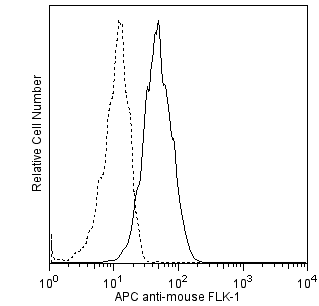Old Browser
This page has been recently translated and is available in French now.
Looks like you're visiting us from {countryName}.
Would you like to stay on the current country site or be switched to your country?


.png)

Flow cytometric analysis of FLK-1 expression on bEnd.3 cells. bEnd.3 cells were stained either with APC Rat IgG2a, κ Isotype Control (Cat. No. 553932/554690; dashed line histogram) or with the APC Rat Anti-Mouse FLK-1 antibody (Cat. No. 560070/561993; solid line histogram). The flow cytometric histograms were derived from events with the forward and side light-scatter characteristics of viable bEnd.3 cells (ATCC CRL-2299). Flow cytometry was performed using a BD™ LSR II Flow Cytometer System.
.png)

BD Pharmingen™ APC Rat anti-Mouse FLK-1
.png)
Regulatory Status Legend
Any use of products other than the permitted use without the express written authorization of Becton, Dickinson and Company is strictly prohibited.
Preparation And Storage
Product Notices
- Since applications vary, each investigator should titrate the reagent to obtain optimal results.
- An isotype control should be used at the same concentration as the antibody of interest.
- Caution: Sodium azide yields highly toxic hydrazoic acid under acidic conditions. Dilute azide compounds in running water before discarding to avoid accumulation of potentially explosive deposits in plumbing.
- For fluorochrome spectra and suitable instrument settings, please refer to our Multicolor Flow Cytometry web page at www.bdbiosciences.com/colors.
- This APC-conjugated reagent can be used in any flow cytometer equipped with a dye, HeNe, or red diode laser.
- Please refer to www.bdbiosciences.com/us/s/resources for technical protocols.
Companion Products


.png?imwidth=320)
.png?imwidth=320)

The Avas 12α1 monoclonal antibody specifically binds to fetal liver kinase 1 (Flk-1) which is also known as CD309. Flk-1 is a receptor protein tyrosine kinase which is closely related to CD117 (c-kit) and CD140a (PDGF Receptor α chain) of the immunoglobulin superfamily. Flk-1, also known as VEGF Receptor-2 (VEGF-R2 or VEGFR2), is a receptor for vascular endothelial growth factor (VEGF). It is expressed, at the mRNA and protein levels, on distinct sets of mesoderm during gastrulation and on endothelial cells in embryonic and adult tissues. In vivo and in vitro studies indicate that Flk-1 is required for the embryonic development of vascular endothelial and hematopoietic cells.

Development References (8)
-
Hanahan D. Signaling vascular morphogenesis and maintenance. Science. 1997; 277(5322):48-50. (Biology). View Reference
-
Kataoka H, Takakura N, Nishikawa S, et al. Expressions of PDGF receptor alpha, c-Kit and Flk1 genes clustering in mouse chromosome 5 define distinct subsets of nascent mesodermal cells.. Dev Growth Differ. 1997; 39(6):729-40. (Immunogen). View Reference
-
Millauer B, Wizigmann-Voos S, Schnurch H, et al. High affinity VEGF binding and developmental expression suggest Flk-1 as a major regulator of vasculogenesis and angiogenesis. Cell. 1993; 72(6):835-846. (Biology). View Reference
-
Nishikawa SI, Nishikawa S, Hirashima M, Matsuyoshi N, Kodama H. Progressive lineage analysis by cell sorting and culture identifies FLK1+VE-cadherin+ cells at a diverging point of endothelial and hemopoietic lineages. Development. 1998; 125(9):1747-1757. (Biology). View Reference
-
Nishikawa SI, Nishikawa S, Kawamoto H, et al. In vitro generation of lymphohematopoietic cells from endothelial cells purified from murine embryos. Immunity. 1998; 8(6):761-769. (Biology). View Reference
-
Quinn TP, Peters KG, De Vries C, Ferrara N, Williams LT. Fetal liver kinase 1 is a receptor for vascular endothelial growth factor and is selectively expressed in vascular endothelium. Proc Natl Acad Sci U S A. 1993; 90(16):7533-7537. (Biology). View Reference
-
Shalaby F, Ho J, Stanford WL, et al. A requirement for Flk1 in primitive and definitive hematopoiesis and vasculogenesis. Cell. 1997; 89(6):981-990. (Biology). View Reference
-
Shalaby F, Rossant J, Yamaguchi TP, et al. Failure of blood-island formation and vasculogenesis in Flk-1-deficient mice. Nature. 1995; 376(6535):62-66. (Biology). View Reference
Please refer to Support Documents for Quality Certificates
Global - Refer to manufacturer's instructions for use and related User Manuals and Technical data sheets before using this products as described
Comparisons, where applicable, are made against older BD Technology, manual methods or are general performance claims. Comparisons are not made against non-BD technologies, unless otherwise noted.
For Research Use Only. Not for use in diagnostic or therapeutic procedures.
Report a Site Issue
This form is intended to help us improve our website experience. For other support, please visit our Contact Us page.